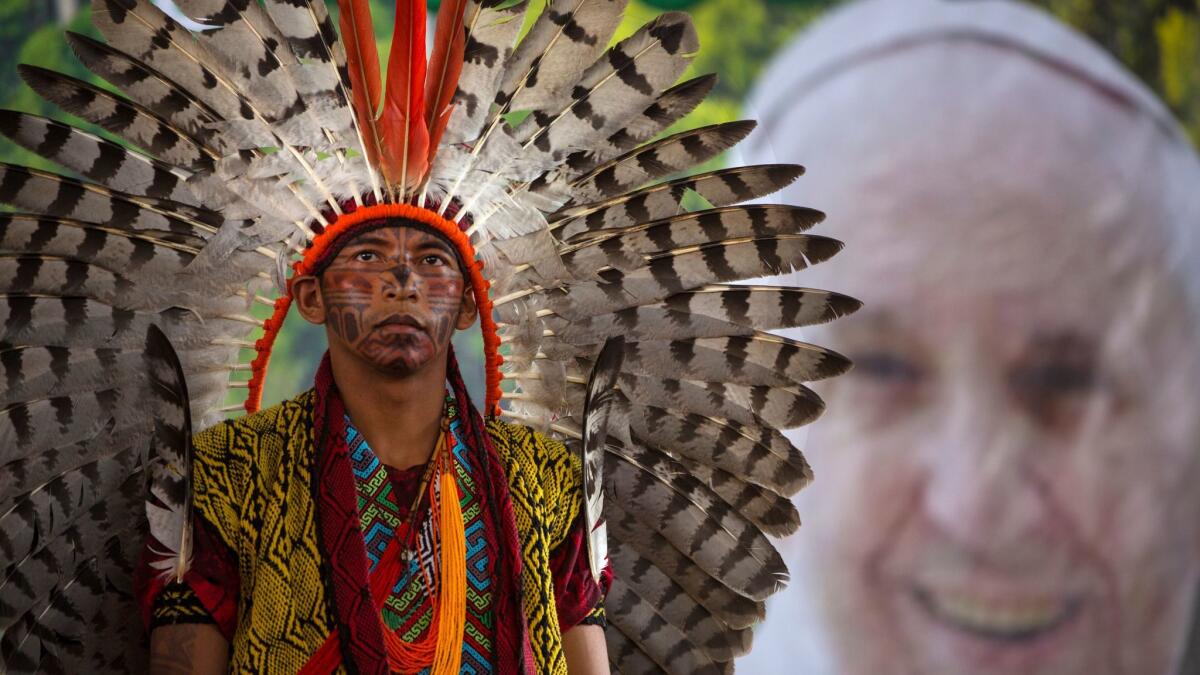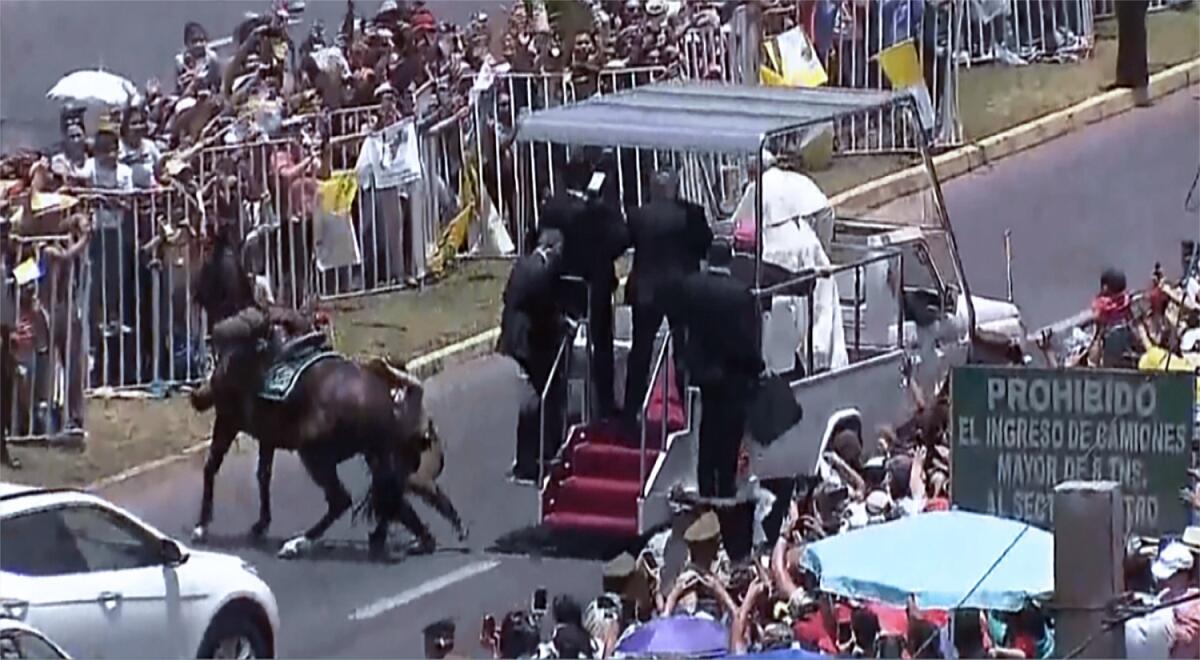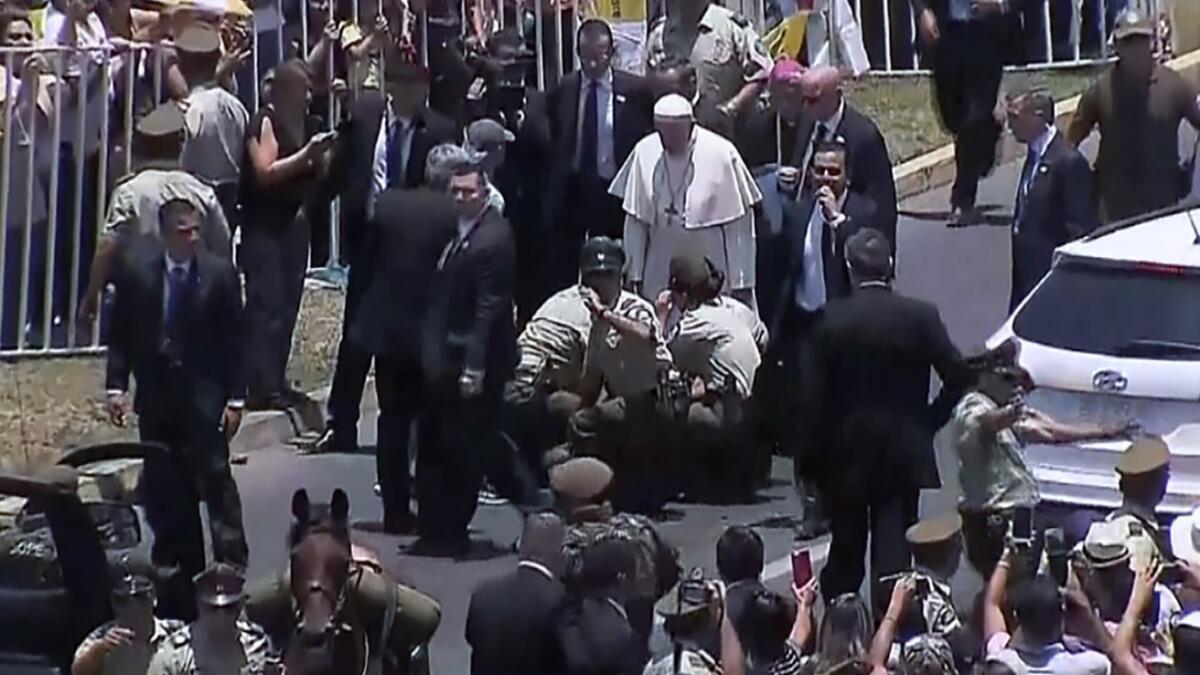Pope Francis urges compassion toward immigrants, those ‘who have had to leave everything behind’

- Share via
Reporting from Santiago, Chile — While celebrating Mass on Thursday near the north Chilean port of Iquique, Pope Francis reminded his listeners that, in the indigenous Aymara language, the city’s name means “land of dreams.”
Iquique was once a booming mining town but is now better known for its beaches, earthquakes and as the gateway for a recent flood of immigrants to Chile.
“It is a land that has given shelter to men and women of different peoples and cultures who have had to leave everything behind and set out,” Francis said before the crowd of faithful estimated at 100,000. “Let us be attentive to the lack of shelter, land and employment experienced by so many families.”
Francis’ remarks — made during a Mass in Lobito Campus, a town a few miles south of Iquique — continued a central theme of his South American journey this week: the need to treat immigrants with compassion.
Chile has accepted waves of immigrants in recent years, including tens of thousands of Venezuelans fleeing their troubled country and Haitians seeking better lives. The policy has created political controversy. A recent poll by CEP, a think tank in Santiago, indicated that 2 of every 5 Chileans believe the newcomers are the source of rising crime, a thesis that police say has no basis in fact.
Many Chileans favor opening their borders, especially to Venezuelans, an indication of the debt many feel to the country that accepted thousands of Chileans exiled in the 1970s by the dictatorship of Gen. Augusto Pinochet. But President-elect Sebastian Pinera, who takes office in March, ran a campaign promising to take a tougher line on immigration than current President Michelle Bachelet.
Pope Francis also leaves Chile having confronted another burning issue for Chileans, that of the clergy’s sexual abuse of minors. At La Moneda presidential palace this week, he apologized and said he felt “pain and shame over the irreparable harm caused to children by church ministers.”
Later during a Mass at a Santiago park attended by an estimated 400,000, Francis reiterated his regrets for “trust betrayed.” The scandals have been cited in polls indicating a significant drop in Chileans identifying themselves as Roman Catholics.
The issue shows no signs of dying. Upon deplaning in Iquique, the pope was asked by a journalist about Bishop Juan Barros of Osorno, a cleric whom Francis elevated but who has been accused of covering up the alleged sexual abuse of minors by Father Fernando Karadima, a diocesan priest condemned by the Vatican in 2011 to a life of “prayer and penitence.”
“There is not a single proof against him,” Francis said Thursday of Barros. “It’s all a calumny.”
During a news conference Thursday in Santiago, James Hamilton, one of Karadima’s best-known and outspoken accusers, said the pope was not doing nearly enough in the aftermath of the scandal.
“What Pope Francis has done is offensive and painful,” Hamilton said, joined by two other Karadima accusers, who also say Barros covered up Karadima’s abuse. “This reveals an unknown face of the pontiff.”
In 2015, Francis defended Barros, saying that he recognized that “Osorno suffers, yes, but for being foolish, because they do not open their hearts to what God says, and instead get carried away by all this silliness that everyone speaks of.”


One bit of drama occurred in Iquique when a mounted police officer was thrown from her horse after it was spooked by crowds cheering the pope. The papal motorcade paused and Francis got out of the popemobile to check on the officer. After five minutes, Francis continued his tour and there was no immediate indication from police that the officer suffered serious injuries.
On Friday morning in Peru, he will meet with President Pedro Pablo Kuczynski and civil society groups before flying to the Amazonian port city of Puerto Maldonado, where he is expected to advocate for the rights of indigenous people and defend the environment against illegal mining and loggers.
It’s a theme that the pope, long a champion of indigenous rights and customs, waded into on Wednesday while celebrating Mass in south-central Chile’s Araucania region. It’s been the scene of often violent protests by Mapuche Indians, who claim their ancestral territory has been decimated by land grabbers, including the state.
In a Mass celebrated in Temuco employing indigenous dress and music, he insisted on peace and reconciliation but acknowledged that Araucania is overshadowed by “a sorrow that cannot be silenced, the injustice of centuries.”
Special correspondents Poblete reported from Santiago and Kraul from Bogota, Colombia.
UPDATES:
3:45 p.m.: This article was updated with comments from James Hamilton and additional background on the Catholic Church in Chile.
This article was originally published at 12:50 p.m.
More to Read
Sign up for Essential California
The most important California stories and recommendations in your inbox every morning.
You may occasionally receive promotional content from the Los Angeles Times.










